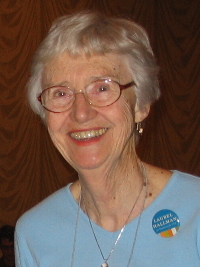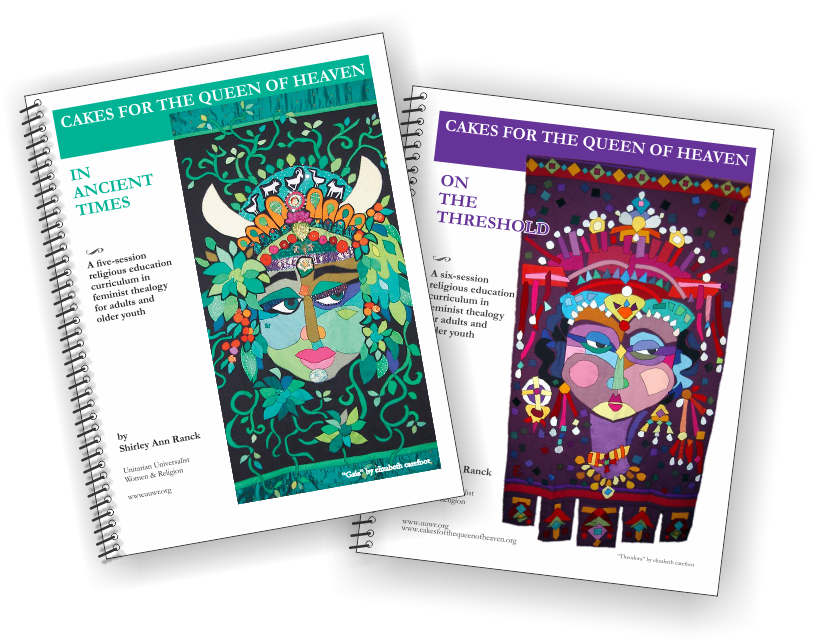OF UNITARIAN UNIVERSALIST WOMEN
Weaving global partnerships to enrich women’s lives
HOUSTON, TEXAS
February 26 – March 1, 2009
 The Convocation opened and closed with a view of Earth from space on two giant screens. The closing song was Blue Boat Home(1) and as it was sung large Earth balls went flying over the heads of the 600 participants who kept them flying by batting them around the large ballroom. It seemed to me that a whole new world-view was finally emerging.
The Convocation opened and closed with a view of Earth from space on two giant screens. The closing song was Blue Boat Home(1) and as it was sung large Earth balls went flying over the heads of the 600 participants who kept them flying by batting them around the large ballroom. It seemed to me that a whole new world-view was finally emerging.The Convocation itself was both exhilarating and sobering. We listened to a stunning array of powerful women speakers, women such as Rev. Dr. Laurel Hallman, Rev. Rosemary Bray McNatt, Rev. Dr. Rebecca Parker, Rev. Dr. Ann Peart from England, Dr. Kalpana Kannabiran from India, Rev. Pap Maria from Transylvania, Dr. Creamlimon Nongbri from India, Rebecca Adamson from the Cherokee Nation, Rev. Rebecca Sienes from The Philippines, Dr. Sharon Welch, Margot Adler of National Public Radio, Frances Moore Lappe, Kathy Matsui from Japan, and many others who led workshops and facilitated small groups. We watched and listened as the chalice was lighted with words from five languages. We sang along with singer/songwriter Carolyn McDade and singing group emma’s revolution.
We met in small Sister Circles to brainstorm and discuss the problems and issues that are of concern to women in all parts of the world. The consensus distilled from all of the groups was that the top issue was education, the second was health care, and the third was domestic violence. These were seen through two lenses, that of poverty and lack of political power.
There were thirty-four workshops on a great variety of topics: Articulating the New Cosmology Emerging From Quantum Physics; Globalized Theological Conversation; Making Education Available Worldwide; Microfinance; Public Health Issues; The Aids Pandemic and Women; Persephone’s Journey: A Transforming Rite of Spring; Singing in a Sacred Circle; Women of Wisdom: Entering the Crone Years, and many more.
I was particularly interested in the workshop on a new cosmology emerging from quantum physics. It was presented by Rev. Gail Collins-Ranadive. She titled the workshop Beyond Finding the Voice Inside and asked where were the female voices articulating that new cosmology. She spoke of conscious evolution and a sustainable planet. I felt that she was
pointing to ideas that I too found compelling. We shared some writing exercises to help us articulate a new world-view. I felt that it was a world-view that was emerging before our eyes at the Convocation.
I was on a panel about theological roots with Margot Adler, Dr. Sharon Welch, Dr. Lilian Burlando from Argentina, and Rev. Tina Geels from The Netherlands. Rev. Jopie Boeke from England was the moderator. We each spoke briefly of our personal theological roots. I told a brief anecdote about each of my parents and then said that I had had to study ancient pre-patriarchal religions to find my theological roots as a woman. In the discussion that followed, it seemed to me that most of us had journeyed some distance from our roots and that we were just beginning to give voice to a new global sense of divinity and value.
 And I wondered if perhaps we were finally going to “change the recipe.” Perhaps you have seen the Women & Religion T-shirt that features a big cherry pie and the words, “We do not want a piece of the pie. It is still a patriarchal pie. We want to CHANGE THE RECIPE!” (2) Toward the end of the Convocation, a woman stood before the gathering of women and said that an international conference of women had taken place in 1985, and another in 1995, and the same problems that had faced women in those decades still faced women today—education, health care, violence, poverty, lack of political power.
And I wondered if perhaps we were finally going to “change the recipe.” Perhaps you have seen the Women & Religion T-shirt that features a big cherry pie and the words, “We do not want a piece of the pie. It is still a patriarchal pie. We want to CHANGE THE RECIPE!” (2) Toward the end of the Convocation, a woman stood before the gathering of women and said that an international conference of women had taken place in 1985, and another in 1995, and the same problems that had faced women in those decades still faced women today—education, health care, violence, poverty, lack of political power. And so we were left with a huge and sobering question: What will it take to make the needed changes? I couldn’t help wondering if a new way of seeing the world, a new “recipe,” was perhaps what had been lacking in the past.
Back in the 19th century Julia Ward Howe issued a proclamation in which she said, “Arise, then, women of this day!...let women now leave all that may be left of home for a great and earnest day of counsel…Let them then solemnly take counsel with each other as to the means whereby the great human family can live in peace…” (3) And so we have met repeatedly and some progress has certainly been made. We know now what the basic issues are for women, but we have not yet changed the patriarchal pie, the oppressive, hierarchical systems in which we are held captive. We are, as women on the global scene, still poor and lacking in the political power and the political will to demand that our values—education, health care, and the absence of violence—be given priority.
Will the new world-view help us as women? I think perhaps it will—eventually. It has taken awhile to come this far in our thinking. A new world-view has clearly emerged from the fractures and shakings of the foundations so vividly portrayed by the poets, artists and theologians of the 20th century. As early as the mid-19th century Emerson said: “The venerable and beautiful traditions to which we were educated are losing their hold on human belief, day by day. The old forms rattle and the new delay to appear. The mind, haughty with its sciences, disdains the religious forms as childish. In consequence of this it appears as the misfortune of this period that the cultivated mind has not the happiness and dignity of the religious sentiment…We are born too late for the old, and too early for the new faith.”
In the middle of the 20th century poet Lawrence Ferlinghetti was still waiting for that new faith to emerge. He said “I am perpetually awaiting a renaissance of wonder.” (4) In the early decades of the 20th century the old forms and traditions, the old world-view, was smashed into a million fragments, discords and disillusionments. If you observe the paintings of Picasso, or listen to the music of Bela Bartok, you can see and hear the fragmentation. Poet T. S. Eliot called it a wasteland. He wrote: “What are the roots that clutch, what branches grow out of this stony rubbish? Son of man, you cannot say, or guess, for you know only a heap of broken images…” (5)
And where were the theologians? As the optimistic social gospel of the 19th century was rejected, a wave of neo-orthodoxy took over, calling us back to the old deterministic world-view of good and evil, conquest and dominion.
Meanwhile our post-modern sciences were challenging that view of the world, leading us to new understandings of change, of process, even evidence of cooperation at the heart of the universe. Some theologians saw that a new world-view was emerging and declared that “God” as we had known “Him” was dead. Some women theologians welcomed that idea. As Naomi Goldenberg said: “God is going to change, I thought. We women are going to bring an end to God…We will change the world so much that He won’t fit in anymore. I found this line of thought most satisfying…I felt part of a movement that would challenge religions that had been in force for millennia.” (6)
Process theologians absorbed the insights of the sciences and began to formulate new theologies. One Unitarian woman, Sophia Lyon Fahs, challenged the old world-view and built her whole theology upon these insights. (7) More recently a Unitarian Universalist scholar, David Bumbaugh, has even suggested a set of beliefs for Unitarian Universalists, one part of which reads: “We believe that all living things are members of a single community, all expressions of a planetary process that produced life and sustains it in intricate ways beyond our knowing. We hold the life process itself to be sacred.” (8)
But I believe it was the appearance of photos of Earth taken from space that gave the new world-view an image, a symbol that has gradually captured the popular imagination. We can finally see our planet as a whole, with a oneness that may ultimately dissolve the hierarchies and divisions which plague us, a oneness that may resonate for all of us as we sing of our “blue boat home.”
*****
1. “Blue Boat Home,” #1064 in Singing the Journey, Unitarian Universalist Association, Boston, 2005.
2. Quote from Rosemary Matson.
3. Howe, Julia Ward #573 in Singing the Living Tradition, Beacon Press, Unitarian Universalist Association Boston, 1993.
4. Ferlinghetti, Lawrence “I Am Waiting,” in A Coney Island of the Mind, New Directions, New York, 1955, p. 53.
5. Eliot, T. S. “The Wasteland,” in The Complete Poems and Plays, Harcourt, Brace and Company, New York, 1952, p. 38.
6. Goldenberg, Naomi, Changing of the Gods, Beacon Press, Boston, 1979, pp. 3-4.
7. Fahs, Sophia Lyon, Today’s Children, Yesterday’s Heritage, Beacon Press, Boston, 1952.
8. Bumbaugh, David “Statement of Belief” in Newsletter of the Covenant of Unitarian Universalist Pagans, Fall, 2008.



